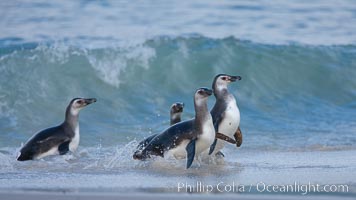
Magellanic penguins, coming ashore on a sandy beach. Magellanic penguins can grow to 30" tall, 14 lbs and live over 25 years. They feed in the water, preying on cuttlefish, sardines, squid, krill, and other crustaceans.
Species: Magellanic penguin, Spheniscus magellanicus
Location: New Island, Falkland Islands, United Kingdom
Image ID: 23926
Species: Magellanic penguin, Spheniscus magellanicus
Location: New Island, Falkland Islands, United Kingdom
Image ID: 23926
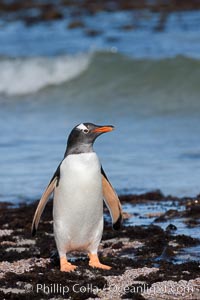
Gentoo penguin, returning from the sea after foraging for crustaceans, krill and fish.
Species: Gentoo penguin, Pygoscelis papua
Location: Carcass Island, Falkland Islands, United Kingdom
Image ID: 23968
Species: Gentoo penguin, Pygoscelis papua
Location: Carcass Island, Falkland Islands, United Kingdom
Image ID: 23968
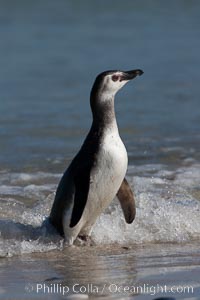
Magellanic penguin, juvenile, coming ashore on a sand beach after foraging at sea.
Species: Magellanic penguin, Spheniscus magellanicus
Location: Carcass Island, Falkland Islands, United Kingdom
Image ID: 23969
Species: Magellanic penguin, Spheniscus magellanicus
Location: Carcass Island, Falkland Islands, United Kingdom
Image ID: 23969
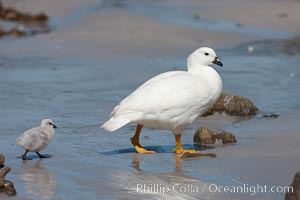
Kelp goose, male with chick.
Species: Kelp goose, Chloephaga hybrida
Location: Carcass Island, Falkland Islands, United Kingdom
Image ID: 24056
Species: Kelp goose, Chloephaga hybrida
Location: Carcass Island, Falkland Islands, United Kingdom
Image ID: 24056
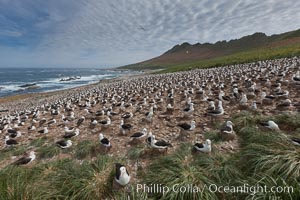
Black-browed albatross colony on Steeple Jason Island in the Falklands. This is the largest breeding colony of black-browed albatrosses in the world, numbering in the hundreds of thousands of breeding pairs. The albatrosses lay eggs in September and October, and tend a single chick that will fledge in about 120 days.
Species: Black-browed albatross, Thalassarche melanophrys
Location: Steeple Jason Island, Falkland Islands, United Kingdom
Image ID: 24078
Species: Black-browed albatross, Thalassarche melanophrys
Location: Steeple Jason Island, Falkland Islands, United Kingdom
Image ID: 24078
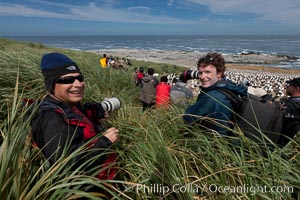
Doug Cheeseman (left), founder of Cheeseman's Ecology Safaris, and professional photographer and guide Patrick Endres (right) enjoy the spectacle of the enormous breeding colony of black-browed albatrosses at Steeple Jason Island.
Species: Black-browed albatross, Thalassarche melanophrys
Location: Steeple Jason Island, Falkland Islands, United Kingdom
Image ID: 24108
Species: Black-browed albatross, Thalassarche melanophrys
Location: Steeple Jason Island, Falkland Islands, United Kingdom
Image ID: 24108
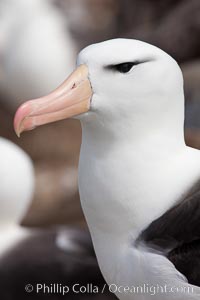
Black-browed albatross, Steeple Jason Island. The black-browed albatross is a medium-sized seabird at 31-37" long with a 79-94" wingspan and an average weight of 6.4-10 lb. They have a natural lifespan exceeding 70 years. They breed on remote oceanic islands and are circumpolar, ranging throughout the Southern Ocean.
Species: Black-browed albatross, Thalassarche melanophrys
Location: Steeple Jason Island, Falkland Islands, United Kingdom
Image ID: 24109
Species: Black-browed albatross, Thalassarche melanophrys
Location: Steeple Jason Island, Falkland Islands, United Kingdom
Image ID: 24109
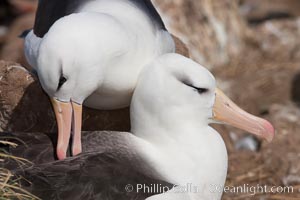
Black-browed albatross, courtship and mutual preening behavior between two mated adults on the nest, Steeple Jason Island breeding colony. Black-browed albatrosses begin breeding at about 10 years, and lay a single egg each season.
Species: Black-browed albatross, Thalassarche melanophrys
Location: Steeple Jason Island, Falkland Islands, United Kingdom
Image ID: 24115
Species: Black-browed albatross, Thalassarche melanophrys
Location: Steeple Jason Island, Falkland Islands, United Kingdom
Image ID: 24115
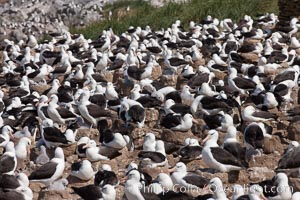
Black-browed albatross colony on Steeple Jason Island in the Falklands. This is the largest breeding colony of black-browed albatrosses in the world, numbering in the hundreds of thousands of breeding pairs. The albatrosses lay eggs in September and October, and tend a single chick that will fledge in about 120 days.
Species: Black-browed albatross, Thalassarche melanophrys
Location: Steeple Jason Island, Falkland Islands, United Kingdom
Image ID: 24119
Species: Black-browed albatross, Thalassarche melanophrys
Location: Steeple Jason Island, Falkland Islands, United Kingdom
Image ID: 24119
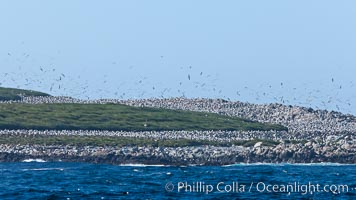
Steeple Jason Island, one of the remote Jason Group of Islands in the West Falklands. Uninhabited, the island is spectacular both for its rugged scenery and its enormous breeding colony of black-browed albatross. Steeple Jason Island is now owned and administered by the Wildlife Conservation Society.
Location: Steeple Jason Island, Falkland Islands, United Kingdom
Image ID: 24129
Location: Steeple Jason Island, Falkland Islands, United Kingdom
Image ID: 24129
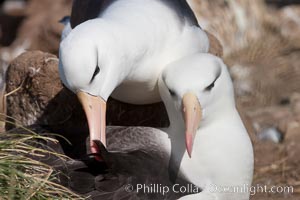
Black-browed albatross, courtship and mutual preening behavior between two mated adults on the nest, Steeple Jason Island breeding colony. Black-browed albatrosses begin breeding at about 10 years, and lay a single egg each season.
Species: Black-browed albatross, Thalassarche melanophrys
Location: Steeple Jason Island, Falkland Islands, United Kingdom
Image ID: 24250
Species: Black-browed albatross, Thalassarche melanophrys
Location: Steeple Jason Island, Falkland Islands, United Kingdom
Image ID: 24250
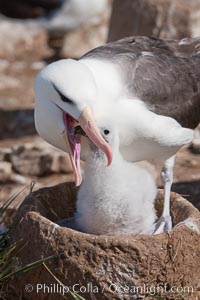
Black-browed albatross, feeding its chick on the nest by regurgitating food it was swallowed while foraging at sea, Steeple Jason Island breeding colony. The single egg is laid in September or October. Incubation takes 68 to 71 days, after which the chick is tended alternately by both adults until it fledges about 120 days later.
Species: Black-browed albatross, Thalassarche melanophrys
Location: Steeple Jason Island, Falkland Islands, United Kingdom
Image ID: 24254
Species: Black-browed albatross, Thalassarche melanophrys
Location: Steeple Jason Island, Falkland Islands, United Kingdom
Image ID: 24254
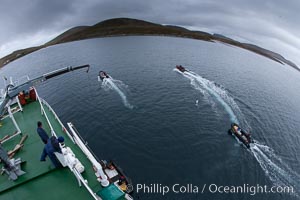
Zodiac boats, are lowered into the ocean from the ship M/V Polar Star in preparation for a day exploring New Island in the Falklands.
Location: New Island, Falkland Islands, United Kingdom
Image ID: 23712
Location: New Island, Falkland Islands, United Kingdom
Image ID: 23712
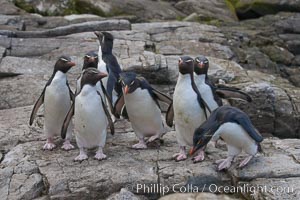
Rockhopper penguins, on rocky coastline of New Island in the Falklands. True to their name, rockhopper penguins scramble over the rocky intertidal zone and up steep hillsides to reach their nesting colonies which may be hundreds of feet above the ocean, often jumping up and over rocks larger than themselves. Rockhopper penguins reach 23" and 7.5lb in size, and can live 20-30 years. They feed primarily on feed on krill, squid, octopus, lantern fish, molluscs, plankton, cuttlefish, and crustaceans.
Species: Rockhopper penguin, Western rockhopper penguin, Eudyptes chrysocome, Eudyptes chrysocome chrysocome
Location: New Island, Falkland Islands, United Kingdom
Image ID: 23741
Species: Rockhopper penguin, Western rockhopper penguin, Eudyptes chrysocome, Eudyptes chrysocome chrysocome
Location: New Island, Falkland Islands, United Kingdom
Image ID: 23741
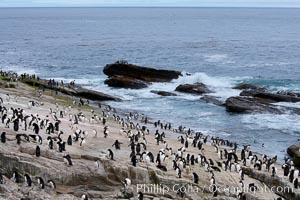
Rockhopper penguins, on rocky coastline of New Island in the Falklands. True to their name, rockhopper penguins scramble over the rocky intertidal zone and up steep hillsides to reach their nesting colonies which may be hundreds of feet above the ocean, often jumping up and over rocks larger than themselves. Rockhopper penguins reach 23" and 7.5lb in size, and can live 20-30 years. They feed primarily on feed on krill, squid, octopus, lantern fish, molluscs, plankton, cuttlefish, and crustaceans.
Species: Rockhopper penguin, Western rockhopper penguin, Eudyptes chrysocome, Eudyptes chrysocome chrysocome
Location: New Island, Falkland Islands, United Kingdom
Image ID: 23743
Species: Rockhopper penguin, Western rockhopper penguin, Eudyptes chrysocome, Eudyptes chrysocome chrysocome
Location: New Island, Falkland Islands, United Kingdom
Image ID: 23743
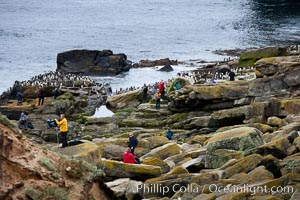
Visitors to New Island, in the Falkland Islands view rockhopper penguins coming and going along the rocky intertidal zone.
Species: Rockhopper penguin, Western rockhopper penguin, Eudyptes chrysocome, Eudyptes chrysocome chrysocome
Location: New Island, Falkland Islands, United Kingdom
Image ID: 23745
Species: Rockhopper penguin, Western rockhopper penguin, Eudyptes chrysocome, Eudyptes chrysocome chrysocome
Location: New Island, Falkland Islands, United Kingdom
Image ID: 23745
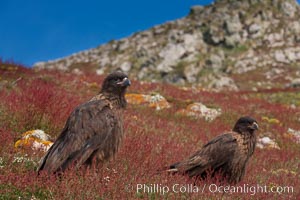
Straited caracara, a bird of prey found throughout the Falkland Islands. The striated caracara is an opportunistic feeder, often scavenging for carrion but also known to attack weak or injured birds.
Species: Striated caracara, Phalcoboenus australis
Location: Steeple Jason Island, Falkland Islands, United Kingdom
Image ID: 24126
Species: Striated caracara, Phalcoboenus australis
Location: Steeple Jason Island, Falkland Islands, United Kingdom
Image ID: 24126
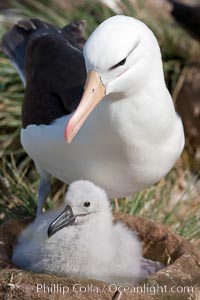
Black-browed albatross, adult and chick, at the enormous colony on Steeple Jason Island in the Falklands. This is the largest breeding colony of black-browed albatrosses in the world, numbering in the hundreds of thousands of breeding pairs. The albatrosses lay eggs in September and October, and tend a single chick that will fledge in about 120 days.
Species: Black-browed albatross, Thalassarche melanophrys
Location: Steeple Jason Island, Falkland Islands, United Kingdom
Image ID: 24260
Species: Black-browed albatross, Thalassarche melanophrys
Location: Steeple Jason Island, Falkland Islands, United Kingdom
Image ID: 24260
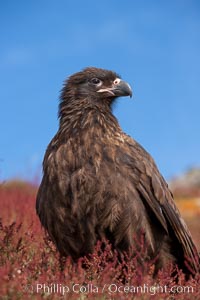
Straited caracara, a bird of prey found throughout the Falkland Islands. The striated caracara is an opportunistic feeder, often scavenging for carrion but also known to attack weak or injured birds.
Species: Striated caracara, Phalcoboenus australis
Location: Steeple Jason Island, Falkland Islands, United Kingdom
Image ID: 24275
Species: Striated caracara, Phalcoboenus australis
Location: Steeple Jason Island, Falkland Islands, United Kingdom
Image ID: 24275
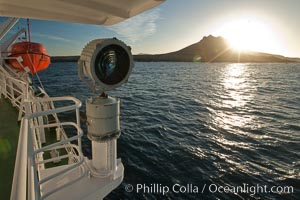
Steeple Jason Island viewed from the M/V Polar Star. Steeple Jason is one of the remote Jason Group of Islands in the West Falklands. Two large mounds of tussock grass, common throughout the Falkland Islands, are seen. Uninhabited, the island is spectacular both for its rugged scenery and its enormous breeding colony of black-browed albatross. Steeple Jason Island is now owned and administered by the Wildlife Conservation Society.
Location: Steeple Jason Island, Falkland Islands, United Kingdom
Image ID: 24285
Location: Steeple Jason Island, Falkland Islands, United Kingdom
Image ID: 24285
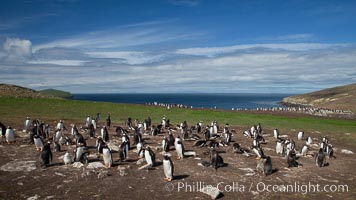
Gentoo penguin colony, set above and inland from the ocean on flat grasslands. Individual nests are formed of small rocks collected by the penguins.
Location: New Island, Falkland Islands, United Kingdom
Image ID: 23801
Location: New Island, Falkland Islands, United Kingdom
Image ID: 23801
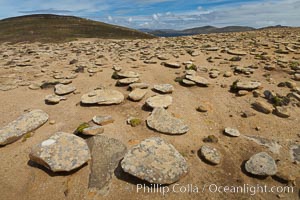
Interesting rock formations on plateau atop New Island.
Location: New Island, Falkland Islands, United Kingdom
Image ID: 23802
Location: New Island, Falkland Islands, United Kingdom
Image ID: 23802
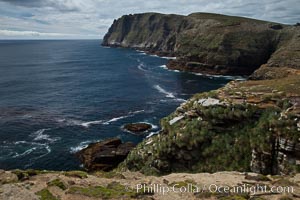
Tall seacliffs overlook the southern Atlantic Ocean, a habitat on which albatross and penguin reside.
Location: New Island, Falkland Islands, United Kingdom
Image ID: 23803
Location: New Island, Falkland Islands, United Kingdom
Image ID: 23803
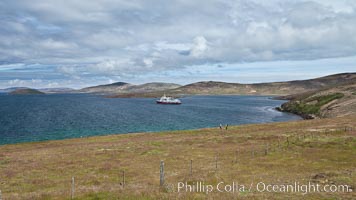
Typical grasslands of the Falkland Islands, a pastoral setting with old wooden fence and rolling fields, icebreaker ship M/V Polar Star at anchor just offshore.
Location: New Island, Falkland Islands, United Kingdom
Image ID: 23804
Location: New Island, Falkland Islands, United Kingdom
Image ID: 23804
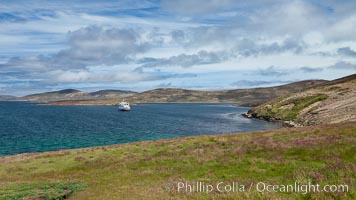
Typical grasslands of the Falkland Islands, with icebreak ship M/V Polar Star at anchor just offshore.
Location: New Island, Falkland Islands, United Kingdom
Image ID: 23805
Location: New Island, Falkland Islands, United Kingdom
Image ID: 23805
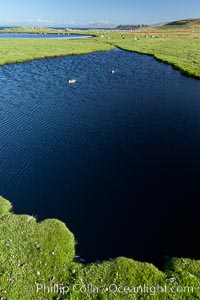
Ponds and grasses, in the interior of Carcass Island near Dyke Bay.
Location: Carcass Island, Falkland Islands, United Kingdom
Image ID: 24027
Location: Carcass Island, Falkland Islands, United Kingdom
Image ID: 24027
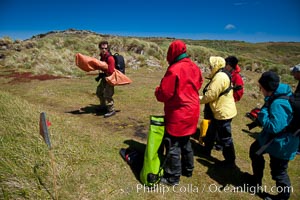
Visitors walk across Carcass Island, named for the HMS Carcass which surveyed the island in 1766.
Location: Carcass Island, Falkland Islands, United Kingdom
Image ID: 24069
Location: Carcass Island, Falkland Islands, United Kingdom
Image ID: 24069
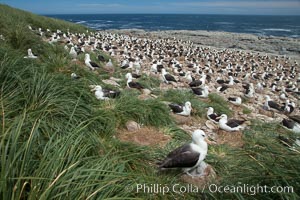
Black-browed albatross colony on Steeple Jason Island in the Falklands. This is the largest breeding colony of black-browed albatrosses in the world, numbering in the hundreds of thousands of breeding pairs. The albatrosses lay eggs in September and October, and tend a single chick that will fledge in about 120 days.
Species: Black-browed albatross, Thalassarche melanophrys
Location: Steeple Jason Island, Falkland Islands, United Kingdom
Image ID: 24103
Species: Black-browed albatross, Thalassarche melanophrys
Location: Steeple Jason Island, Falkland Islands, United Kingdom
Image ID: 24103
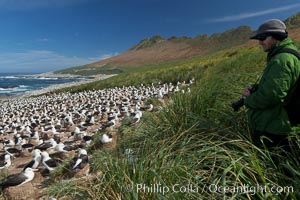
Black-browed albatross colony on Steeple Jason Island in the Falklands. This is the largest breeding colony of black-browed albatrosses in the world, numbering in the hundreds of thousands of breeding pairs. The albatrosses lay eggs in September and October, and tend a single chick that will fledge in about 120 days.
Species: Black-browed albatross, Thalassarche melanophrys
Location: Steeple Jason Island, Falkland Islands, United Kingdom
Image ID: 24121
Species: Black-browed albatross, Thalassarche melanophrys
Location: Steeple Jason Island, Falkland Islands, United Kingdom
Image ID: 24121
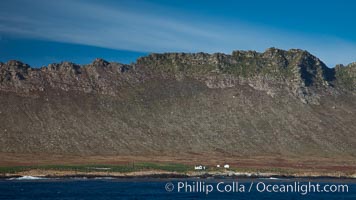
Steeple Jason Island, one of the remote Jason Group of Islands in the West Falklands. Two large mounds of tussock grass, common throughout the Falkland Islands, are seen. Uninhabited, the island is spectacular both for its rugged scenery and its enormous breeding colony of black-browed albatross. Steeple Jason Island is now owned and administered by the Wildlife Conservation Society.
Location: Steeple Jason Island, Falkland Islands, United Kingdom
Image ID: 24128
Location: Steeple Jason Island, Falkland Islands, United Kingdom
Image ID: 24128